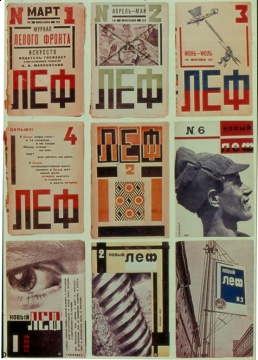LEF
LEF [ЛЕФ] was the journal of the Left Front of the Arts [Левый фронт искусств; Levy Front Iskusstv], a wide-ranging association of avant-garde writers, photographers, critics and designers in the Soviet Union. It had two runs, one from 1923 to 1925 as LEF, and later from 1927 to 1929 as Novyi LEF [New LEF]. The journal’s objective, as set out in one of its first issues, was to “re-examine the ideology and practices of so-called leftist art, and to abandon individualism to increase art’s value for developing communism.”
Contents
Although LEF was catholic in its choices of writers, it broadly reflected the concerns of the Productivist left-wing of Constructivism. The editors were Osip Brik and Vladimir Mayakovsky: fittingly, one a Russian Formalist critic and one a poet and designer who helped compose the 1912 manifesto of Russian Futurists entitled, A Slap in the Face of Public Taste. The covers were designed by Alexander Rodchenko, and featured photomontages early on, being followed by photographs in New LEF. Among the writings published in LEF for the first time were Mayakovsky's long poem About This, and Sergei Eisenstein's The Montage of Attractions, as well as more political and journalistic works like Isaac Babel's Red Cavalry. The journal had funding from the state, and was discussed critically, but not unsympathetically by Leon Trotsky in Literature and Revolution (1924).
The later New LEF [Новый ЛЕФ; Novyi Lef], which was edited by Mayakovsky along with the playwright, screenplay writer and photographer Sergei Tretyakov, tried to popularise the idea of "Factography": the idea that new technologies such as photography and film should be utilised by the working class for the production of ‘factographic’ works. In this it had a great deal of influence on theorists in the West, especially Walter Benjamin and Bertolt Brecht. Linked journals also appeared such as the Constructivist architectural journal SA (edited by Moisei Ginzburg and Alexander Vesnin) and Proletarskoe Foto, on photography. The New LEF closed in 1929 over a dispute over its direction between Mayakovsky and Tretyakov, and under pressure for its "Formalism", which jarred with the incipient Socialist Realism.
In 1924-25, an affiliated magazine, Yugo-LEF, was published in Odessa with L. Nedolya as editor and Semyon Kirsanov as key contributor. [1] [2]
Issues
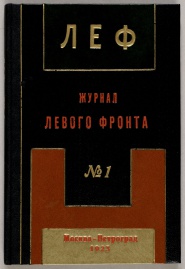 LEF 1 (1923). Download (192 mb) |
 LEF 3 (1923). Download (202 mb) |
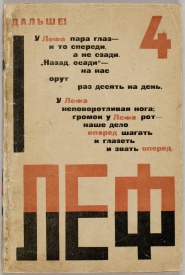 LEF 4 (1924). Download (227 mb) |
 LEF II/6 (1924). Download (148 mb) |
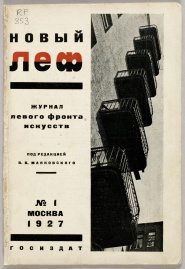 Novyi LEF 1 (1927). Download (54 mb) |
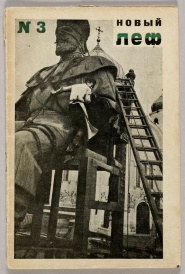 Novyi LEF 3-4 (1927). Download (54 mb) |
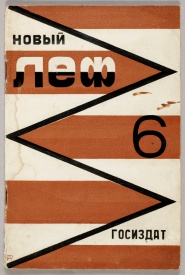 Novyi LEF 6-8 (1928). Download (55 mb) |
 Novyi LEF 12 (1928). Download (60 mb) |
The above PDFs are linked from Bibliothèque Kandinsky, [3].
- B/W scans of full runs: LEF 1-7, 1923-25 (ZIP), Novyi LEF 1-24, 1927-29 (ZIP). These PDFs are sourced from Abertura dos livros collection on Scribd.
- LEF and Novyi LEF in HTML on SovLit.
Literature
- Screen, Vol. 12, No. 4: Documents from Lef, 1971-72, pp 25-160. [4] [5]
- Halina Stephan, “Lef” and the Left Front of the Arts, Munich: Otto Sagner, 1981.
- Literatura fakta [Литература факта: первый сборник материалов работников ЛЕФа], 2000. (in Russian)
- October 118 (Fall 2006): "Soviet Factography", ed. Devin Fore, MIT Press.
- Yaroslav Dmitriyevich Zagorets, Periodicheskiye izdaniya LEF: istoriya, teoriya i praktika [Периодические издания ЛЕФ:история,теория и практика], 2012, 140 pp. Dissertation. (in Russian) [6]
- Emily Finer, "'A rift on the left front': Lef (1923-5) and Na postu (1923-5)", in The Oxford Critical and Cultural History of Modernist Magazines: Vol. 3: Europe 1880-1940, Oxford University Press, 2013. [7]
See also
- Vladimir Mayakovsky, Osip Brik
- Russia#Avant-garde
- Central and Eastern Europe#Literature, literary theory, aesthetics
Links
- LEF at Monoskop Log
- "LEF & the Social Command", D. N. Rodowick’s course on Aesthetics and Philosophy of Film.
- LEF in Virtual Museum of Avant-Garde Art
- http://feb-web.ru/feb/litenc/encyclop/le6/le6-3412.htm
- Yugo LEF in Bibliotheque Kandinsky
- LEF at Russian Wikipedia
| Avant-garde and modernist magazines | ||
|---|---|---|
|
Poesia (1905-09, 1920), Der Sturm (1910-32), Blast (1914-15), The Egoist (1914-19), The Little Review (1914-29), 291 (1915-16), MA (1916-25), De Stijl (1917-20, 1921-32), Dada (1917-21), Noi (1917-25), 391 (1917-24), Zenit (1921-26), Broom (1921-24), Veshch/Gegenstand/Objet (1922), Die Form (1922, 1925-35), Contimporanul (1922-32), Secession (1922-24), Klaxon (1922-23), Merz (1923-32), LEF (1923-25), G (1923-26), Irradiador (1923), Sovremennaya architektura (1926-30), Novyi LEF (1927-29), ReD (1927-31), Close Up (1927-33), transition (1927-38). | ||
| Full list | ||
|---|---|---|
|
Entretiens politiques et littéraires (1890-93), Moderní revue (1894-1925), Volné směry (1897-1948), Mir iskusstva (1898-1904), Vesy (1904-09), Poesia (1905-09, 1920), Zolotoe runo (1906-10), The Mask (1908-29), Apollon (1909-17), Ukraïnska khata (1909-14), Der Sturm (1910-32), Thalia (1910-13), Rhythm (1911-13), Trudy i dni (1912), Simbolul (1912), The Glebe (1913-14), Ocharovannyi strannik (1913-16), Revolution (1913), Blast (1914-15), The Little Review (1914-29), Futuristy (1914), Zeit-Echo (1914-17), The Egoist (1914-19), L'Élan (1915-16), 291 (1915-16), Orpheu (1915), La Balza futurista (1915), MA (1916-25), SIC (1916-19), flamman (1916-21), The Blindman (1917), Nord-Sud (1917-18), De Stijl (1917-20, 1921-32), Dada (1917-21), Klingen (1917-20, 1942), Noi (1917-25), 391 (1917-24), Modernisme et compréhension (1917), Anarkhiia (1917-18), Iskusstvo kommuny (1918-19), Formiści (1919-21), S4N (1919-25), La Cité (1919-35), Aujourd'hui (1919), Exlex (1919-20), L'Esprit nouveau (1920-25), Orfeus (1920-21), Action (1920-22), Proverbe (1920-22), Ça ira (1920-23), Zenit (1921-26), Kinofon (1921-22), Het Overzicht (1921-25), Jednodńuwka futurystuw (1921), Nowa sztuka (1921-22), Broom (1921-24), Život (1921-48), Creación (1921-24), Jar-Ptitza (1921-26), New York Dada (1921), Aventure (1921-22), Spolokhi (1921-23), Gargoyle (1921-22), Veshch/Gegenstand/Objet (1922), Kino-fot (1922-23), Le Coeur à barbe (1922), Die Form (1922, 1925-35), 7 Arts (1922-28), Manomètre (1922-28), Ultra (1922), Út (1922-25), Dada-Jok (1922), Dada Tank (1922), Dada Jazz (1922), Mécano (1922-23), Contimporanul (1922-32), Zwrotnica (1922-23, 1926-27), Secession (1922-24), Stavba (1922-38), Gostinitsa dlya puteshestvuyuschih v prekrasnom (1922-24), Putevi (1922-24), Klaxon (1922-23), Akasztott Ember (1922-23), MSS (1922-23), Perevoz Dada (1922-49), Egység (1922-24), L'Architecture vivante (1923-33), Merz (1923-32), LEF (1923-25), G (1923-26), The Next Call (1923-26), Russkoye iskusstvo (1923), Disk (1923-25), Irradiador (1923), Surréalisme (1924), Almanach Nowej Sztuki (1924-25), La Révolution surréaliste (1924-29), Blok (1924-26), Pásmo (1924-26), DAV (1924-37), Bulletin de l'Effort moderne (1924-27), ABC (1924-28), CAP (1924-28), Athena (1924-25), Punct (1924-25), 75HP (1924), Le Tour de Babel (1925), Periszkop (1925-26), Integral (1925-28), Praesens (1926, 1930), Sovremennaya architektura (1926-30), bauhaus (1926-31), Das neue Frankfurt (1926-31), L'Art cinématographique (1926-31), Dokumentum (1926-27), Kritisk Revy (1926-28), Novyi LEF (1927-29), i 10 (1927-29), Nova generatsiia (1927-30), ReD (1927-31), Dźwignia (1927-28), Tank (1927-28), Close Up (1927-33), Horizont (1927-32), transition (1927-38), Discontinuité (1928), Munka (1928-39), Quosego (1928-29), Urmuz (1928), Unu (1928-32), Revista de Antropofagia (1928-29), 50 u Evropi (1928-29), Documents (1929-30), L'Art Contemporain - Sztuka Współczesna (1929-30), Adam (1929-40), Art concret (1930), Zvěrokruh (1930), Alge (1930-31), Le Surréalisme au service de la révolution (1930-33), Levá fronta (1930-33), Kvart (1930-37, 1945-49), Nová Bratislava (1931-32), Linja (1931-33), Spektrum (1931-33), Nadrealizam danas i ovde (1931-32), Ulise (1932-33), Die neue Stadt (1932-33), Mouvement (1933), PLAN (1933-36), Karavan (1934-35), Ekran (1934), Axis (1935-37), Acéphale (1936-39), Telehor (1936), aka (1937-38), Plastique (1937-39), Plus (1938-39), Les Réverbères (1938-39). | ||
